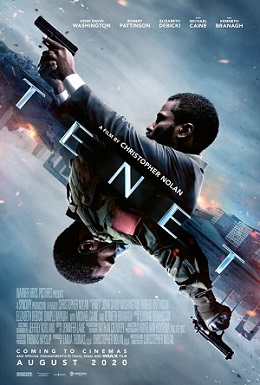Explore the time-bending world of Tenet

Photo from Wikipedia, property of Warner Bros. Studios.
Christopher Nolan’s Tenet premiered Sept. 3, 2020 in theaters and on-demand
September 15, 2020
Tenet, a highly-anticipated original film by Christopher Nolan, redefines the genre of traditional espionage movies.
Nolan can be credited for his swift, complex films that inspire a new form of moviemaking. This visual masterpiece does not depend on CGI to carry the intense effects of the film, bringing a sense of reality to its audience.
Similar to many of Nolan’s previous films, Tenet is based around the theme of time manipulation. The manipulation of physics and time is referred to as “inversion” in the film. The manipulation of physics brought to life by Nolan’s artistic direction is a new take on the concept of time travel.
The best display of the concept of inversion can be seen in the movie trailers when “The Protagonist,” played by John David Washington, aims a gun, but rather than shooting, he catches a bullet back into the gun’s barrel.
By naming a character “The Protagonist,” the audience can focus on the character’s purpose, rather than their human connection to him. After passing an arduous test for his loyalty to the CIA, “The Protagonist” is assigned to prevent mass genocide and war that could be sparked by people in the future who use inversion.
Proving to be a strong lead, Washington delivers with his masterful fighting sequences and genuine performance.
The film’s antagonist is Andrei Sator, a Russian arms dealer played by Kenneth Branagh.
Another notable performance is Robert Pattinson, playing the allied spy Neil, who transcends from his Twilight days into an eager action star. The film also stars Elizabeth Debicki, who portrays the character Kat, a fierce mother caught in the middle of inversion.
Though this film brings a unique concept to cinema, its fast-paced nature makes it a complex film. The dialogue clashes with the film score’s electronic waves, creating a distracting imbalance. This impedes on its audience’s ability to comprehend the film’s story.
Fortunately, the film’s composer, Ludwig Goransson, creates a memorable score that elevates the urgency of the characters’ journey.
This film forces its audience to look past the usual themes based around human emotions and instead find value in futuristic concepts such as time inversion. The advancing world brings awareness to how technology can be beneficial or destructive for society.
Similar to this idea, Tenet shows how inversion can either save or end the world.
Nolan’s futuristic themes raise questions about his audience’s own relationship with technology. He highlights this theme by utilizing the amount of power inversion has.
Christopher Nolan fans can expect to watch an intricate film similar to Inception or Interstellar, but Tenet far exceeds the complexity of its predecessors. With the concept of time being the more threatening opponent, Tenet’s audience may be left with more questions than answers after watching this film, making it a window into the future of cinema.


stzgists • Jan 14, 2021 at 6:15 am
This tenet movie was so confusing the first time I watched it that I had to delete it even my family members were all pissed, but when my friends were talking about it I had to go get it again and watched and understand it. however I later watched another movie lupin and that one I really like and I think that’s the best tv series this year.